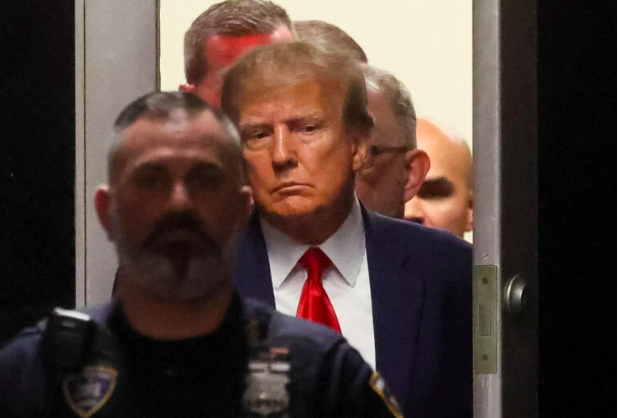Donald Trump has been booked and charged – what happens now?

Former U.S. President Donald Trump arrives at Manhattan Criminal Courthouse, after his indictment by a Manhattan grand jury following a probe into hush money paid to porn star Stormy Daniels, in New York City, U.S., April 4, 2023. REUTERS/Brendan McDermid
The events underlying the criminal case against Donald Trump – hush money payments to suppress stories about extramarital affairs – took place nearly seven years ago.
But any potential trial could be more than a year away. That raises the possibility that the former US president could face a jury in a Manhattan courtroom as he seeks a return to the White House – or even after the November 2024 election.
After Trump pleaded not guilty to 34 felony charges of falsifying business records on Tuesday, Judge Juan Merchan set the next court hearing for Dec. 4.
Prosecutors said they plan to request a trial date of January 2024, while Trump’s legal team suggested a spring 2024 trial.
In the courtroom, on the campaign trail
In the first three quarters of 2022, the average criminal case in Manhattan took more than 900 days to move from indictment to a trial verdict, according to data from the state’s division of criminal justice services.
Trump’s case is far from typical, and his lawyers say they intend to fight it aggressively with a blizzard of paperwork.
That could conceivably push any trial past the timetable floated by the two sides and closer to the presidential election.
The state-by-state contests for the Republican nomination is scheduled for the first half of 2024. The party will formally select a nominee in mid-2024 to face the Democratic nominee – likely incumbent President Joe Biden.
If elected, Trump would not hold the power to pardon himself of state charges. But putting a president-elect or president on trial for state charges would enter uncharted legal waters.
“This is so unprecedented that it’s hard for me to say,” said Karen Friedman Agnifilo, a former Manhattan prosecutor. “I think it’s tricky.”
Aside from the New York case, Trump faces federal criminal investigations over allegations he tried to overturn his 2020 election defeat and mishandling of classified documents. He also faces a Georgia investigation into his attempts to fight his 2020 defeat in that state.
Challenging the case
In his early career in real estate, as a television celebrity and then in politics, the famously litigious Trump has employed aggressive counter-attacks and delay tactics when confronted with legal challenges.
Trump has accused Manhattan District Attorney Alvin Bragg, an elected Democrat, of targeting him for political gain and could try to seek dismissal of the charges on those grounds.
He has complained that Merchan, the judge, treated his company unfairly when he oversaw a criminal tax-fraud trial last year.
On Tuesday morning Trump said the case should be moved from heavily Democratic Manhattan to Staten Island, a more conservative part of New York City.
Trump’s lawyers would have to file a motion showing why Merchan is unqualified to handle the case. That would likely be denied as there is no basis for recusal, said Marc Scholl, a former Manhattan assistant district attorney.
Likewise, any request to change the venue would likely be denied this far in advance of a trial, Scholl said.
Trump will likely pursue other avenues as well, some of which could present thorny legal issues that take time to resolve.
Falsifying business records is typically a misdemeanor punishable by no more than one year in prison under New York state law. Bragg elevated those charges to felonies, each carrying a maximum of four years in prison, by arguing that Trump falsified those records to cover up campaign-finance violations.
Using state election law in that manner – and in a case involving a federal, not a state, candidate – is an untested legal theory, legal experts said, and Trump’s lawyers would be sure to challenge it.
Trump could also challenge whether the statute of limitations – five years in this instance – should have run out. That deadline has been extended due to the disruptions caused by the COVID-19 pandemic.
Under New York law, the statute of limitations can also be extended if the defendant has been out of state, but Trump may argue that serving as U.S. president should not apply.
“This is a dream case for defense attorneys,” former prosecutor David Shapiro said last week.
RELATED STORIES:
Defiant Trump pleads not guilty to 34 felony counts
US Republicans defend Trump by attacking criminal justice system
‘I’m not a victim’: Stormy Daniels, ex-porn star in the spotlight
The post Donald Trump has been booked and charged – what happens now? appeared first on Cebu Daily News.

No comments: